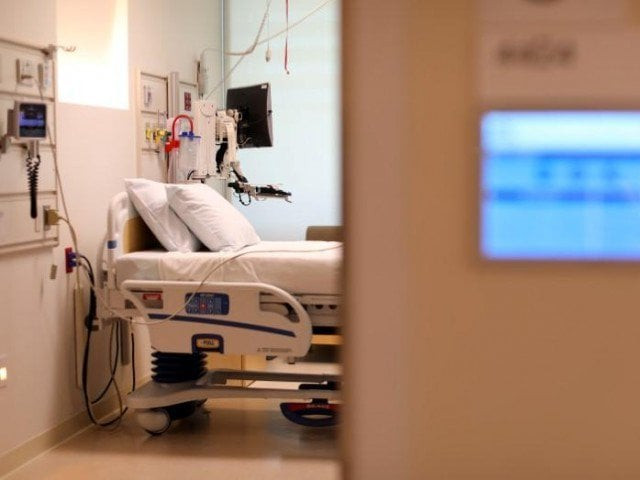LUH’s Covid-19 ward a casualty of negligence
Virus patients complain of ‘sickening’ conditions at Hyderabad’s largest hospital

Representational Image
PHOTO: REUTERS
The LUH, a teaching hospital of Liaquat University of Medical and Health Sciences, is among three hospitals in the district admitting coronavirus patients. Its Covid-19 ward consists of 40 beds - 20 each in the intensive care unit (ICU) and high dependency unit (HDU) - but it has been catering to more critically ill patients than the other two hospitals.
It also happens to be the only hospital in Hyderabad providing plasma therapy, while the Liaquat University of Medical and Health Sciences research and diagnostic laboratory, which has been providing testing services for more than half of Sindh's districts, is also located on its premises.
Nevertheless, despite the availability of senior consultants from LUMHS, considerable financial resources and dedicated supervision by the district administration, complaints abound.
"Inattentive doctors and staff, delayed medication, and filthy toilets are just some of the problems," claimed Shahzeb Ahmed, whose mother is admitted in the ward. "Although the consultants regularly visit the patients and prescribe medicines, the medication is not administered on time."
Another patient, who was admitted along with his mother earlier this week, told The Express Tribune that on the afternoon of his admission, the ward was sweltering. "Even the fan above our beds was not working. It took them hours to repair a fault in its wiring."
Both he and his mother were struggling with low oxgen saturation, along with other symptoms. Both tested negative for the virus, but were admitted on the basis of scand showing opacity in their lungs. "The pulmonologist prescribed medication but it took the duty doctors five hours to administer it," he complained.
A video recently shared on social media shows a doctor haranguing a patient trying to describe the coughing suddenly being experienced by his brother, admitted in the same ward. "I am a coronavirus patient and I do not expect the doctor treating me to shout at me so violently," the patient said in the video.
District officials and doctors in the ward, too, concede the shortcomings. "If the complaints of inattentive doctors weren't true, the deputy commissioner (DC) wouldn't have installed CCTV cameras to monitor the wards," pointed out a doctor, requesting anonymity. "The DC isn't monitoring the patients, he's monitoring the doctors."
DC Fuad Ghaffar Soomro, meanwhile, told The Express Tribune that the cameras in the ward had been activated and he would be monitoring the performance of doctors and nurses himself this week onwards.
On June 15, Soomro had written to the Sindh health secretary, identifying a host of problems impeding patient care. "The situation at the ICU and HDU [of LUH] is pathetic and not satisfactory. The lives of patients are at high risk," he wrote, adding that there was just one nurse available to look after 25 patients.
He demanded the posting of a proactive medical superintendent, appointing one nurse per two beds, availability of doctors around the clock and the presence of at least two doctors and two technicians in each ICU shift. He also called for vital signs monitors for each bed.
Acknowledging the shortage of trained ICU nurses and technicians, Dr Mujeeb Kalwar, the ward's focal person, claimed that authorities were making fresh appointments of nurses this week to address the problem. "We are trying to ensure the presence of a doctor, a nurse and a technician in the ICU at all times."
Doctors' associations, meanwhile have been demanding risk allowances for those health workers dealing with Covid-19 patients. Those in the ward say the lack of incentives is a barrier to their optimal performance.
"The first challenge is to address the shortage of skilled doctors and nurses, which is only being done now, after four months," said a doctor on the condition of anonymity. "The second, and larger, challenge is to find dedicated and fearless workers to serve patients."
Published in The Express Tribune, June 22nd, 2020.



















COMMENTS
Comments are moderated and generally will be posted if they are on-topic and not abusive.
For more information, please see our Comments FAQ